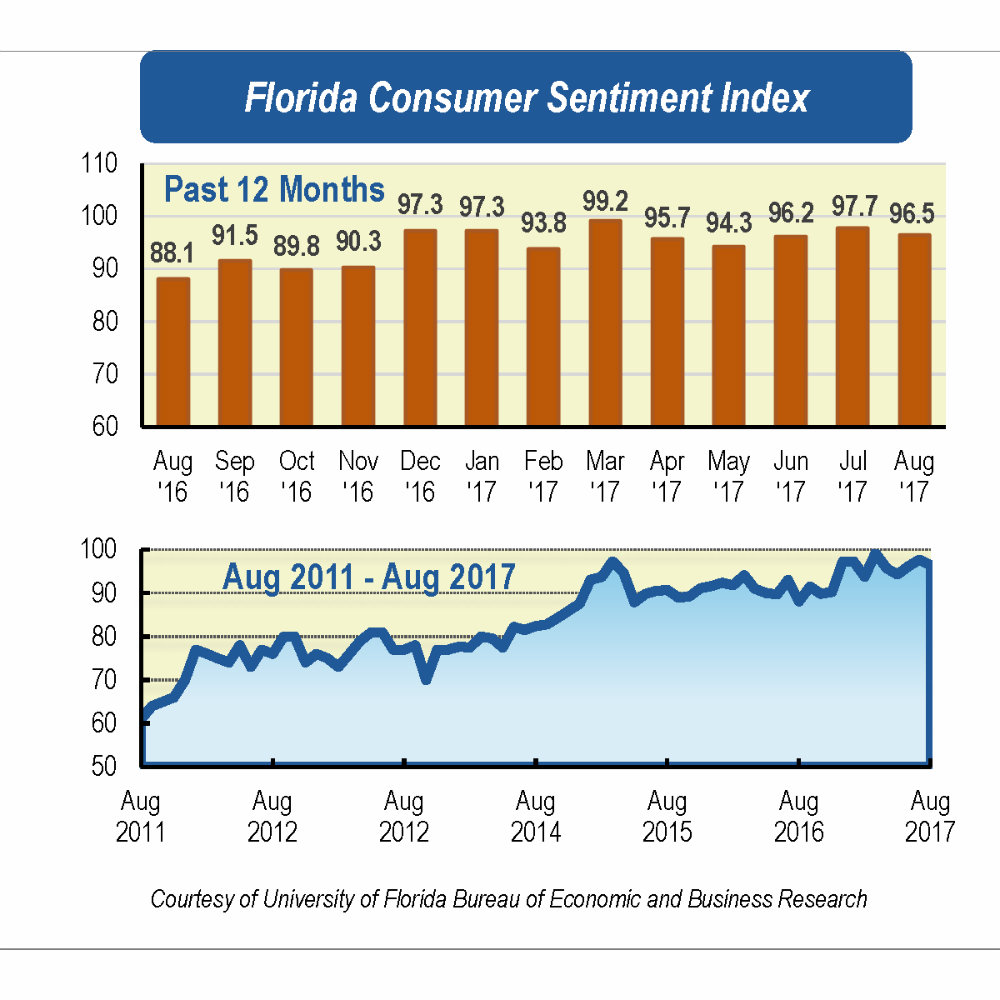
Consumer sentiment among Floridians dropped 1.2 points in August to 96.5. Among the five components that make up the index, one increased and four decreased.
Respondents’ overall views of their personal financial situation now compared with a year ago ticked down one-tenth of a point, from 88.2 to 88.1; however, there was a split by gender, with the reading rising 4.8 points for men but dropping 4.7 points for women.
Opinions about whether now is a good time to buy a big-ticket household item such as an appliance dropped one-tenth of a point, from 102.8 to 102.7.
“In the last two months, July and August, Floridians’ perceptions of present economic conditions shifted slightly downward; nonetheless, they remained 2.6 points higher than the average over the last 12 months,” said Hector H. Sandoval, director of the Economic Analysis Program at UF’s Bureau of Economic and Business Research.
Expectations of personal finances a year from now increased two points, from 103.8 to 105.8. Anticipated U.S. economic conditions over the next year decreased 1.8 points, from 98.1 to 96.3. Expectations of U.S. economic conditions over the next five years showed the largest drop of any reading this month, falling 6.1 points from 95.8 to 89.7. These three components indicate opinions about future economic conditions.
“Most of the pessimism in August stems from negative expectations regarding the national economic conditions in the long run. It might be the case that consumers remember their experience a decade ago when the earliest signs of a weakening economy began to appear, and they may be expecting a repeat of the cycle. This may be reflected in the latest trends of the three ‘expectations’ components of the index,” Sandoval said.
Sandoval noted that despite the overall decline in the index, people 60 and older consistently reported very high consumer sentiment. “In particular, they hold positive views regarding their personal financial situation compared with a year ago and are very optimistic about their personal finances in the short-run,” Sandoval said.
He added, “Those with income under $50,000, however, reported negative perceptions and very unfavorable expectations. In fact, most of the pessimism came from those with income under $50,000, who held unfavorable expectations about the national economic conditions in the short and long run.”
Various reports indicate that both the U.S. and Florida’s economies are performing well and their prospects for 2018 remain good. In Florida, jobs have been added on a monthly basis over the last seven years. Florida’s job gains were led by construction, education and health services, and professional and business services industries.
In July, the unemployment rate in Florida remained unchanged from June at 4.1 percent. That number is particularly significant because an unemployment rate around 4 percent is considered to reflect a full-employment economy.
“Despite the positive economic signals, particularly in the labor market, consumer opinions in the short run may be affected by uncertainty around federal fiscal policy with talk of major changes to the tax code and a possible government shutdown,” Sandoval said.
Conducted Aug. 1-24, the UF study reflects the responses of 403 individuals who were reached on cellphones, representing a demographic cross section of Florida.
The index used by UF researchers is benchmarked to 1966, which means a value of 100 represents the same level of confidence for that year. The lowest index possible is a 2, the highest is 150.
Details of this month’s survey can be found at http://www.bebr.ufl.edu/csi-data.